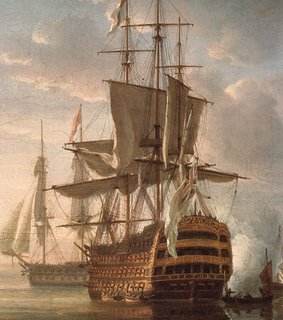Nicolas Pocock, Naval Artist
 Forgive my indulgence, but I've just discovered that a distant relative of mine, Nicolas Pocock, was quite the accomplished naval artist. What craft!
Forgive my indulgence, but I've just discovered that a distant relative of mine, Nicolas Pocock, was quite the accomplished naval artist. What craft!The image, at right, is a portion of one of his many excellent paintings. It depicts the HMS VICTORY, Admiral Lord Nelson's flagship, during the Battle of Trafalgar off the coast of Spain, 1805.
This is a double thrill as I'm a minor student of that moment in history. Nelson died a national hero on the bridge [correction - Nelson died below deck, 4:30 pm] of the HMS VICTORY that day as the British fleet saved the island from French invasion.



6 Comments:
Gorgeous painting Bill. How did you find out he was a distant relative? Able to dig up any portraits/drawings of the dude?
Billy:
Actually, it was the legendary "Spanish Armada" that did in Nelson. There might have been some Froggies in there but they probably fled at the first sign of a stomped grape shortage, croque monsieur shotage, truffle shortage or, ultimately, hostilites. :-)
Derek
Yes, I don't deny there were Spanish warships (under Admiral Gravinas) formed the Combined Fleet with the French. However, I understand that it was the French Admiral Villeneuve who held command of the fleet as Napoleon's servant.
At the risk of turning this into a naval warfare blog, I refer to a full account (with diagrams) of the battle supplied at... http://www.nelsonsnavy.co.uk/
battle-of-trafalgar.html
"[Napoleon] realised that if war broke out again then the Royal Navy would blockade French and continental ports as they had done before and French overseas trade would be crippled. So he planned to invade England and free the seas for French trade. He ordered the building of a fleet of invasion barges and the Grand Army was moved to the Pas de Calais area.
But to get the army across safely the French fleet would need to control the English Channel. To this end he tried to engineer a meeting of his fleets so they could control the sealanes, and protect his invasion barges. He gave orders for the fleets in Toulon, Brest and Ferrol to break out of their blockaded ports [under the command of Admiral Villeneuve]."
That was the beginning and Trafalgar was the end. Napoleon's Grand Army lost the escort at Trafalgar.
As for Nelson's end, it came in the form of a musket ball from a French marine aboard the French Redoubtable in close action with the Victory.
"The Victory and the Redoubtable crashed together and their yards locked. Redoubtable shut most of her gunports to prevent boarding and the French marines in the rigging threw grenades and fired down onto the deck of the Victory . At about 1.15 pm as Nelson and Hardy walked on the quarter deck a musket ball fired from Redoubtable struck Nelson in the top of the shoulder and smashed into his spine. He knew straight away that the wound would be fatal, and as he was carried down to the orlop deck he covered his face with a handkerchief."
"Slowly the British ships gained the upper hand as one by one the ships of the Combined Fleet struck their colours or sailed away from the battle. Captain Hardy reported to Nelson that the battle was won, 'Thank God I have done my duty', were his last words, and he died at 4.30pm."
Mary, I'd like to think N. Pocock is a distant relative because I like his skill and subject matter. To be honest, I don't know. 'Pocock' is appearently ancient Anglo-Saxon (applied to a proud and gaudy person - of course!), so I imagine there's quite a few of us over there. A collection of the painter's work can be found by Googling 'Nicolas Pocock'.
I did find this, however...
"Pocock was born and brought up in Bristol, went to sea at the age of 17 and rose to command several merchant ships. Although he only took up painting as a profession in his early forties, he became extremely successful, receiving commissions from naval commanders anxious to have accurate portrayals of actions and ships. By the age of 80, Pocock had recorded nearly forty years of maritime history, demonstrating a meticulous understanding of shipping and rigging with close attention to detail."
Source: http://www.nmm.ac.uk/mag/pages/mnuExplore/
PaintingDetail.cfm?ID=BHC0549
Thanks for asking.
Touche. I stand corrected.
Derek
Thanks for keeping me honest, Derek.
I have a confession to make: March 16th, I thought the same about the Spanish Armada taking out Nelson. Prior to posting a comment over at Top Superstar on the subject of Nelson, I came across the web texts on Trafalgar - I didn't even know where the heck Trafalgar was.
So, I'm just some slob quoting from a text book.
Keep the comments coming!
Post a Comment
<< Home